Overview
We recognize that the adoption of healthcare cloud solutions is not just a trend; it is a necessity for modern providers aiming to enhance patient care, increase operational efficiency, and bolster data security. These key benefits collectively contribute to improved health outcomes and significant cost savings.
For instance, our cloud solutions:
- Facilitate immediate access to patient data
- Streamline operations through automation
- Implement robust security measures
As a result, we are transforming healthcare delivery and fostering innovation.
What’s holding your team back from embracing these advancements? We invite you to explore how we can support your journey towards a more efficient and secure healthcare environment.
Introduction
In the rapidly evolving landscape of healthcare, we recognize that cloud computing stands as a transformative force, reshaping how patient care is delivered and managed. By providing our healthcare partners with real-time access to critical patient data, cloud solutions enhance decision-making, streamline operations, and improve overall care quality.
The integration of advanced technologies such as telehealth, AI, and data analytics not only fosters collaboration among healthcare teams but also empowers patients to take an active role in their health management.
As we increasingly adopt these innovative solutions, the implications for patient engagement, operational efficiency, and data security become paramount, paving the way for a more responsive and effective healthcare system.
Are we ready to embrace this change together?
Enhanced Patient Care Through Cloud Solutions
Healthcare cloud adoption empowers us, as medical providers, with immediate access to individual data, which is essential for prompt decision-making and tailored care. For example, electronic health records (EHRs) stored online enable us to quickly access individual histories, lab results, and treatment plans. This immediacy not only facilitates well-informed clinical choices but also significantly enhances the standard of care, especially in urgent situations where swift responses are crucial.
The impact of remote computing on care quality is underscored by a significant statistic: healthcare organizations that embrace cloud adoption are better positioned to remain competitive and deliver high-quality care. eClinicalWorks, a leader in online EHR solutions, reported an annual revenue of $1.3 billion, highlighting the financial sustainability and growth potential of internet technology in healthcare.
Furthermore, a recent collaboration between Cerner Corporation and Amazon Web Services aims to bolster the data security of EHR solutions, vital for maintaining trust and ensuring compliance with regulations. This partnership illustrates our sector’s commitment to healthcare cloud adoption for improved health outcomes.
Real-world examples effectively showcase these advantages. CareCloud, which secured $15 million in seed funding in April 2024, is innovating its cloud-based EHR and telemedicine offerings specifically for small practices. This funding will enable CareCloud to enhance its services, thereby reaching more small healthcare practices and improving care through better access to technology and resources.
Moreover, the integration of digital medicine, particularly through AI and VR, is transforming care by humanizing interactions and enhancing treatment options. For instance, AI-powered tools can provide tailored guidance and assistance, while VR technologies can alleviate discomfort and stress during medical procedures, demonstrating the profound impact of these advancements on individual experiences.
Expert insights further emphasize the benefits of healthcare cloud adoption for systems. Dmitriy Stepanov notes that cloud adoption enhances online infrastructure, supporting telehealth and seamless integrations with EHRs, EMRs, and medical billing systems, thereby improving care for individuals. Additionally, Intermountain Healthcare’s telehealth initiative achieved an impressive 36.5% reduction in mortality over a year, underscoring the significant influence of online-based systems on individual outcomes.
In conclusion, the integration of internet technology in medical services not only boosts immediate access to individual data but also greatly enhances the overall standard of care through healthcare cloud adoption. For us, contemporary medical providers, embracing digital services is crucial to remain competitive and deliver the highest quality of patient care.
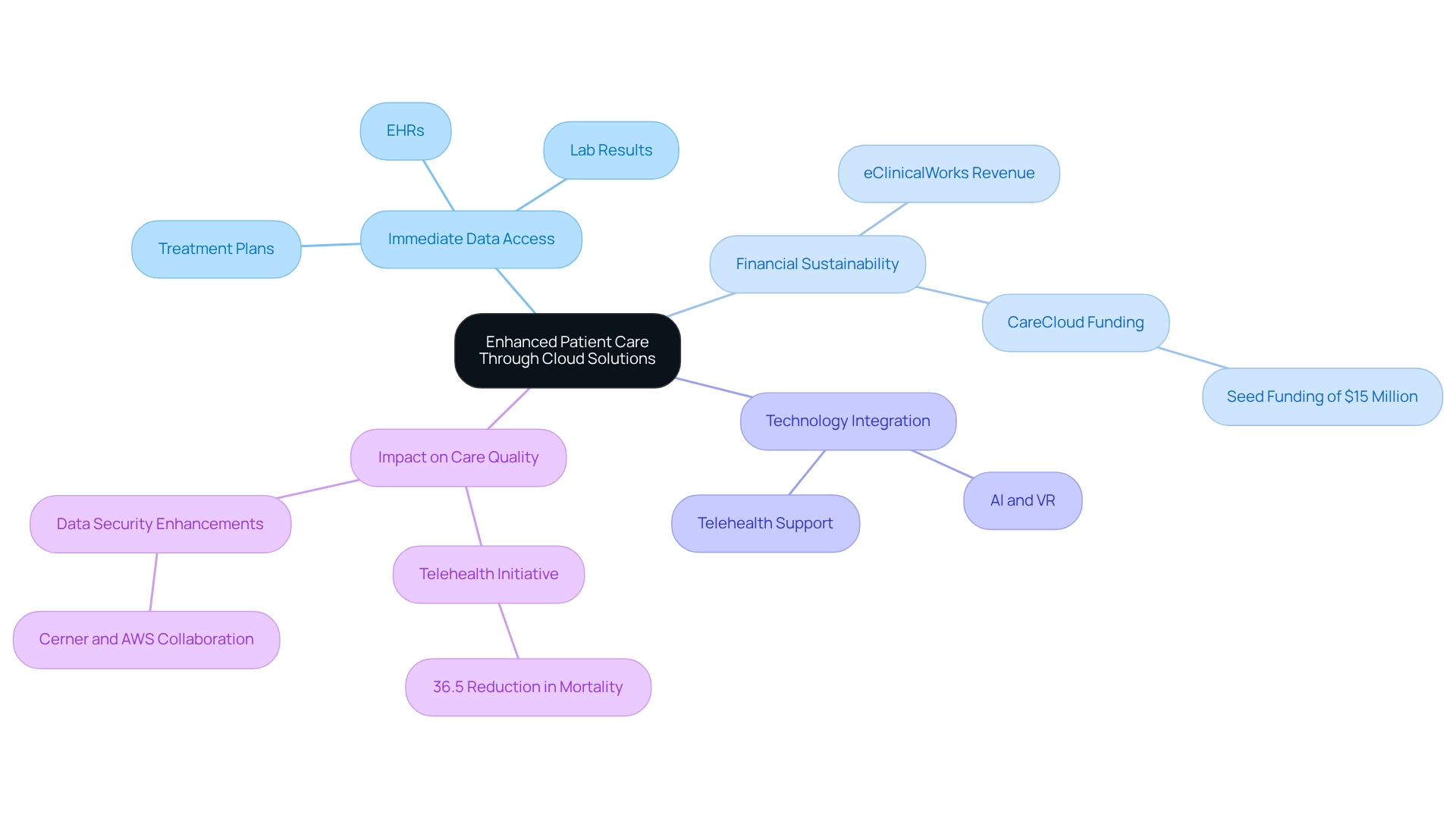
Increased Operational Efficiency and Cost Savings
Cloud computing fundamentally transforms our reliance on extensive on-site infrastructure, resulting in significant cost savings for medical organizations. By utilizing Avato’s Secure Hybrid Integration Platform, we can maximize the value of legacy systems while simplifying complex integrations. This ultimately leads to reduced expenses associated with hardware maintenance, software updates, and IT staffing.
For instance, transitioning to online services can decrease operational costs, with some medical providers reporting savings of up to 30% on IT spending. This is particularly relevant in light of the stark contrast in billing expenses for inpatient surgical procedures, which average $215 in the US compared to just $6 in Canada, highlighting the financial benefits that cloud adoption can facilitate.
Moreover, cloud solutions enhance operational efficiency by automating routine tasks, allowing medical professionals to focus more on patient care rather than administrative responsibilities. Automated billing and scheduling systems exemplify this efficiency, streamlining operations and minimizing wait times, which in turn enhances patient satisfaction. Our platform also ensures 24/7 availability and reliability, crucial for maintaining service delivery in medical environments. Additionally, it offers real-time monitoring and alerts on system performance, further improving operational oversight.
A case study on disaster recovery within the medical sector demonstrates how cloud technology not only secures data sustainability but also boosts the resilience of medical systems, enabling rapid recovery from disruptions.
As medical organizations increasingly adopt healthcare cloud solutions, they are experiencing improvements in operational efficiency and cost savings. This trend is supported by insights from IT managers in the medical field who emphasize the importance of reducing on-premises infrastructure costs to reallocate resources toward care and innovative services. Vlad Nazarov, a Content Manager at TATEEDA, articulates, ‘Cloud-based systems enable patients to access a range of high-quality medical services, including telemedicine and analytical insights.’
The integration of AI and machine learning within Avato’s cloud platform is also revolutionizing medical service delivery, making information more accessible while introducing new management challenges. Overall, the transition to cloud-based systems is proving to be a game-changer for contemporary medical providers, enhancing both efficiency and cost-effectiveness.
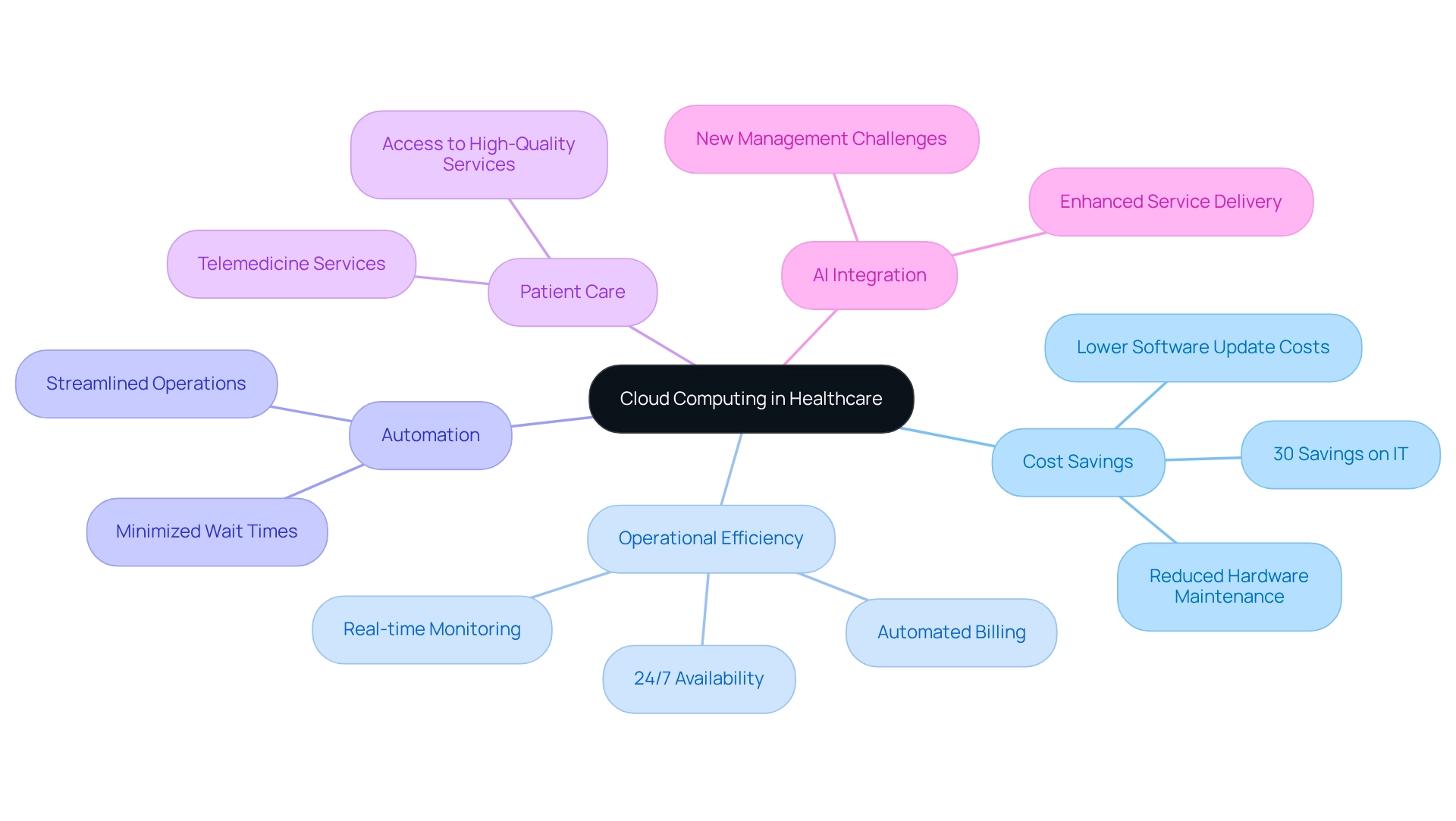
Scalability to Meet Growing Healthcare Demands
Healthcare cloud adoption is not just a trend; it is a transformative force that offers remarkable scalability, allowing us to adapt our resources with agility based on demand. Consider the peak periods, such as flu outbreaks, when hospitals must rapidly expand their IT infrastructure to accommodate surges in visitor volume. This flexibility enables us to manage increased demand without incurring substantial capital costs. Such adaptability ensures we maintain high service levels and significantly enhances patient care outcomes. For instance, the implementation of cloud-based E-prescription systems streamlines the prescription process and reduces errors.
At the forefront of this transformation is Avato’s Secure Hybrid Integration Platform, which maximizes and extends the value of our legacy systems. It simplifies complex integrations and leads to significant cost reductions. Key features of our platform include:
- Real-time monitoring and alerts on system performance, which are vital for maintaining operational efficiency.
- Healthcare leaders emphasize that adopting cloud solutions is essential for effectively managing peak demand.
As B.J. Moore, CIO of Providence, aptly stated, ‘All the waves of innovation are going to be in the digital realm, and if you want to compete, you have to be in the digital realm.’
Furthermore, with modern encryption and firewall capabilities, our online platforms enhance data protection, ensuring compliance and security for sensitive health information. As we increasingly rely on online solutions, healthcare cloud adoption becomes pivotal for the seamless expansion of IT resources, solidifying our operational resilience and enhancing client care. Avato’s platform guarantees 24/7 availability and reliability for complex systems.
To fully leverage the benefits of healthcare cloud adoption, we recommend:
- Implementing regular training for our staff on cloud technologies.
- Establishing clear protocols for data management.
- Continuously evaluating our cloud strategies to adapt to evolving demands.
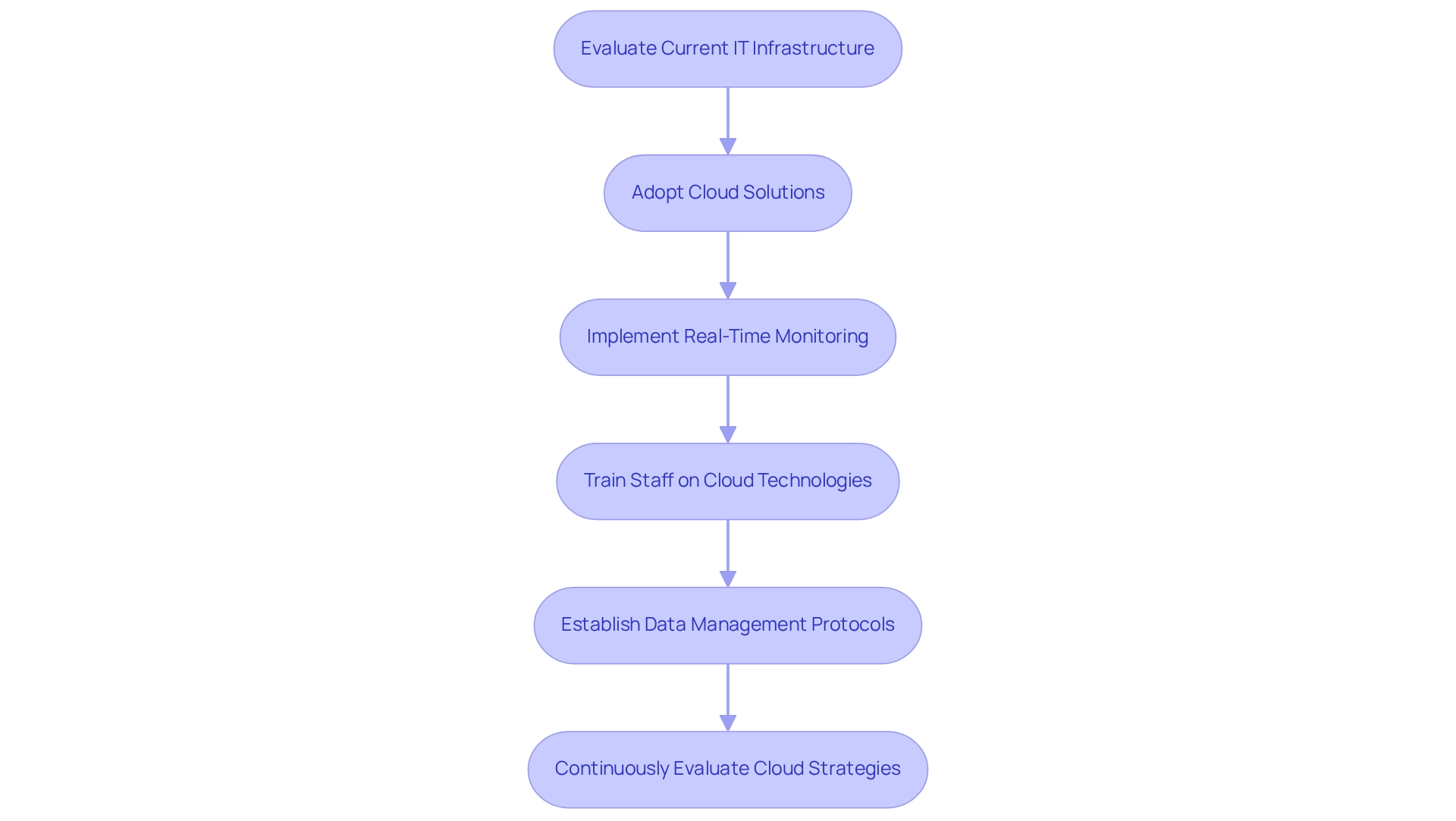
Improved Data Security and Compliance Management
We recognize that cloud providers implement comprehensive security measures, including data encryption, stringent access controls, and regular security audits, to safeguard sensitive client information. These features are crucial for medical organizations striving for healthcare cloud adoption while complying with regulations such as HIPAA, ensuring that patient data is managed securely and responsibly. In fact, statistics from Nivedita James Palatty indicate that 30% of all large data breaches occur in hospitals, underscoring the critical need for effective security protocols. Furthermore, in 2024, 92% of medical service providers reported at least one cyberattack, highlighting the urgent need for robust cybersecurity measures.
Healthcare cloud adoption frequently incorporates built-in compliance management tools that streamline adherence to regulatory requirements, significantly reducing the risk of costly fines and reputational damage. As we expect the medical sector to allocate over $125 billion on cybersecurity products and services from 2020 to 2025, this projected investment indicates an increasing awareness of the necessity for strong cybersecurity frameworks to safeguard sensitive medical data. This proactive method not only improves data security but also cultivates trust among individuals and stakeholders alike.
Additionally, with 72% of organizations granting advanced permissions to third-party insiders, stringent access controls are essential to mitigate risks associated with third-party access. Furthermore, the incorporation of AI and VR technologies in medical settings can further improve data accessibility and user engagement, enabling a more human-centered approach to care. By leveraging these digital solutions, we enable healthcare cloud adoption that ensures patient data is not only secure but also readily available for informed decision-making, ultimately transforming the patient experience.
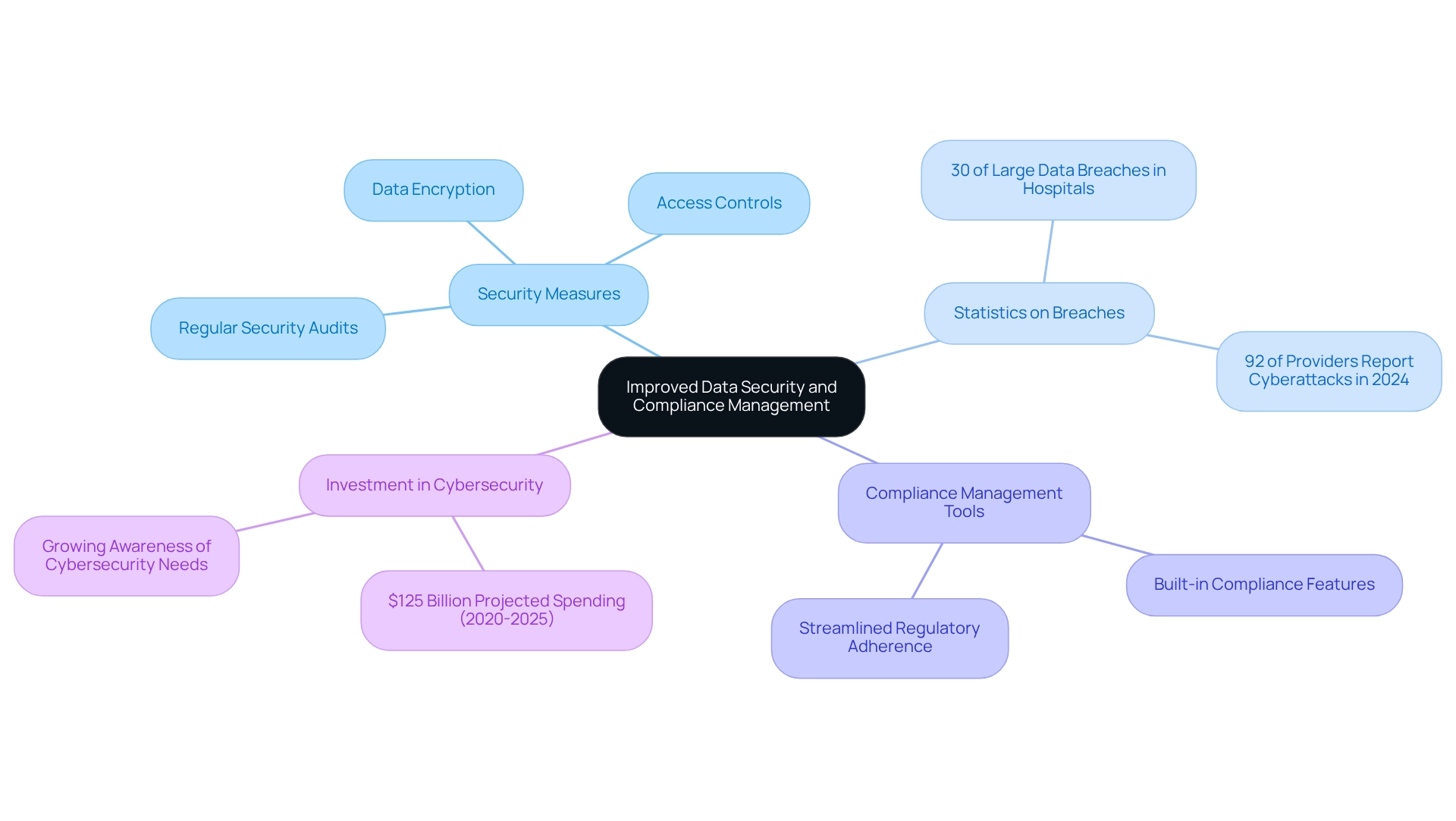
Enhanced Collaboration Among Healthcare Teams
Healthcare cloud adoption significantly enhances collaboration among medical teams by providing centralized platforms for information sharing and resource management. Tools such as shared electronic health records (EHRs) and integrated communication systems empower us, as healthcare professionals, to work together seamlessly, irrespective of our physical locations. Imagine a collaborative team of specialists accessing an individual’s comprehensive medical history and treatment plans simultaneously. This not only facilitates coordinated care but also leads to enhanced outcomes.
The influence of shared EHRs on teamwork is substantial. Integrated health networks that have embraced online technologies report a 40% increase in interoperability, enabling smoother data exchange between hospitals, clinics, and specialists. As a result, this improved connectivity decreases unnecessary tests and simplifies care processes. Furthermore, organizations that utilize healthcare cloud adoption are 60% more inclined to encounter fewer security incidents, as indicated by CynergisTek. This emphasizes the vital role of secure collaboration in our medical environments.
At Avato, we have crafted a secure hybrid integration platform to manage intricate systems, guaranteeing 24/7 uptime and dependability—essential for the medical field. By facilitating smooth integration of isolated legacy systems, we empower medical organizations to unlock the full potential of their data, ultimately improving care and operational efficiency.
Expert opinions underscore that ongoing training and healthcare cloud adoption are essential for minimizing human error, which contributes to 85% of security breaches, according to CISA. By cultivating a culture of ongoing education and utilizing advanced digital platforms such as ours, medical teams can greatly enhance their collaborative efforts, ultimately resulting in improved outcomes for individuals and more effective operational management.
For banking IT managers, adopting cloud solutions not only enhances collaboration but also ensures that sensitive data is managed securely, aligning with the stringent regulatory requirements of the sector.
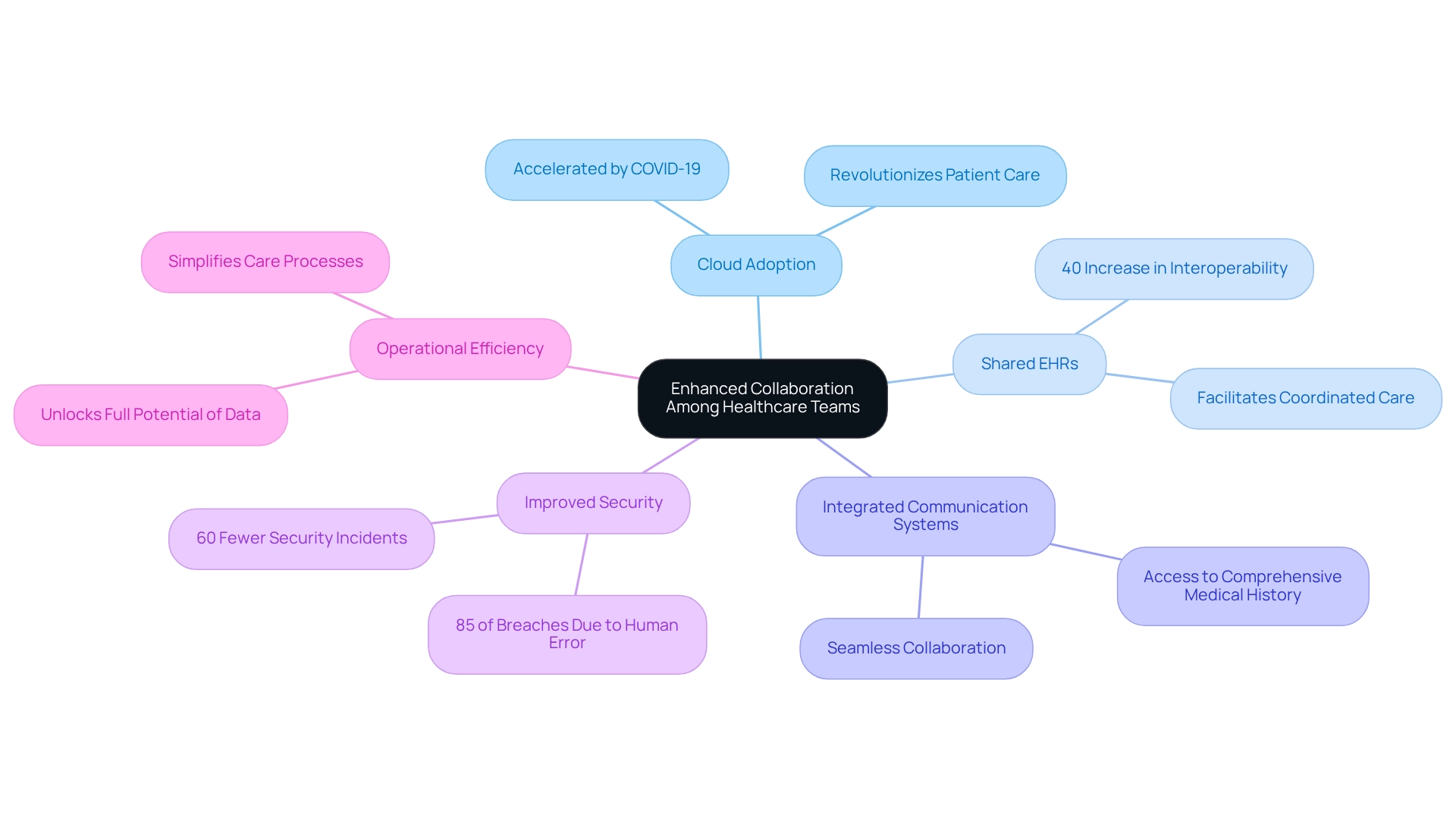
Advanced Data Analytics for Informed Decision-Making
Cloud-based data analytics tools are indispensable for our healthcare cloud adoption. They empower healthcare organizations to swiftly and effectively analyze extensive client information. By leveraging advanced analytics, we can uncover health trends, predict outcomes, and customize treatments to meet individual needs. For example, predictive analytics is vital in identifying individuals at risk of chronic conditions, enabling early interventions that significantly enhance health outcomes. The urgency of adopting such technologies is underscored by the tragic statistic that at least 50 physicians lost their lives while treating COVID-19 patients in March 2020, highlighting the critical need for effective management strategies.
The North American healthcare computing market is poised for growth, driven by increasing healthcare spending and technological advancements. Organizations that cultivate an analytics culture can enhance their decision-making processes. A case study titled ‘Cultivating an Analytics Culture in Healthcare’ illustrates the positive impact of prescriptive analytics on healthcare outcomes. Moreover, adopting cloud analytics not only streamlines data analysis but also improves the accuracy of outcome predictions, ultimately leading to better management of chronic diseases.
We recognize that medical organizations utilizing advanced data analysis tools, such as AI and VR technologies, are better equipped to navigate the complexities of care. These innovations not only humanize medical care by providing personalized treatment options but also enhance data accessibility for individuals, empowering them to manage their health information. With potential cost savings—such as 30% through virtualization and 40% via pay-as-you-go models—healthcare cloud adoption presents a compelling case for contemporary providers aiming to boost operational efficiency while delivering exceptional care. Furthermore, organizations certified under specific frameworks are 60% more likely to experience fewer security incidents, emphasizing the importance of security in healthcare cloud adoption. This integration of analytics not only elevates patient care but also informs financial decision-making within medical organizations, making it relevant for banking IT managers.
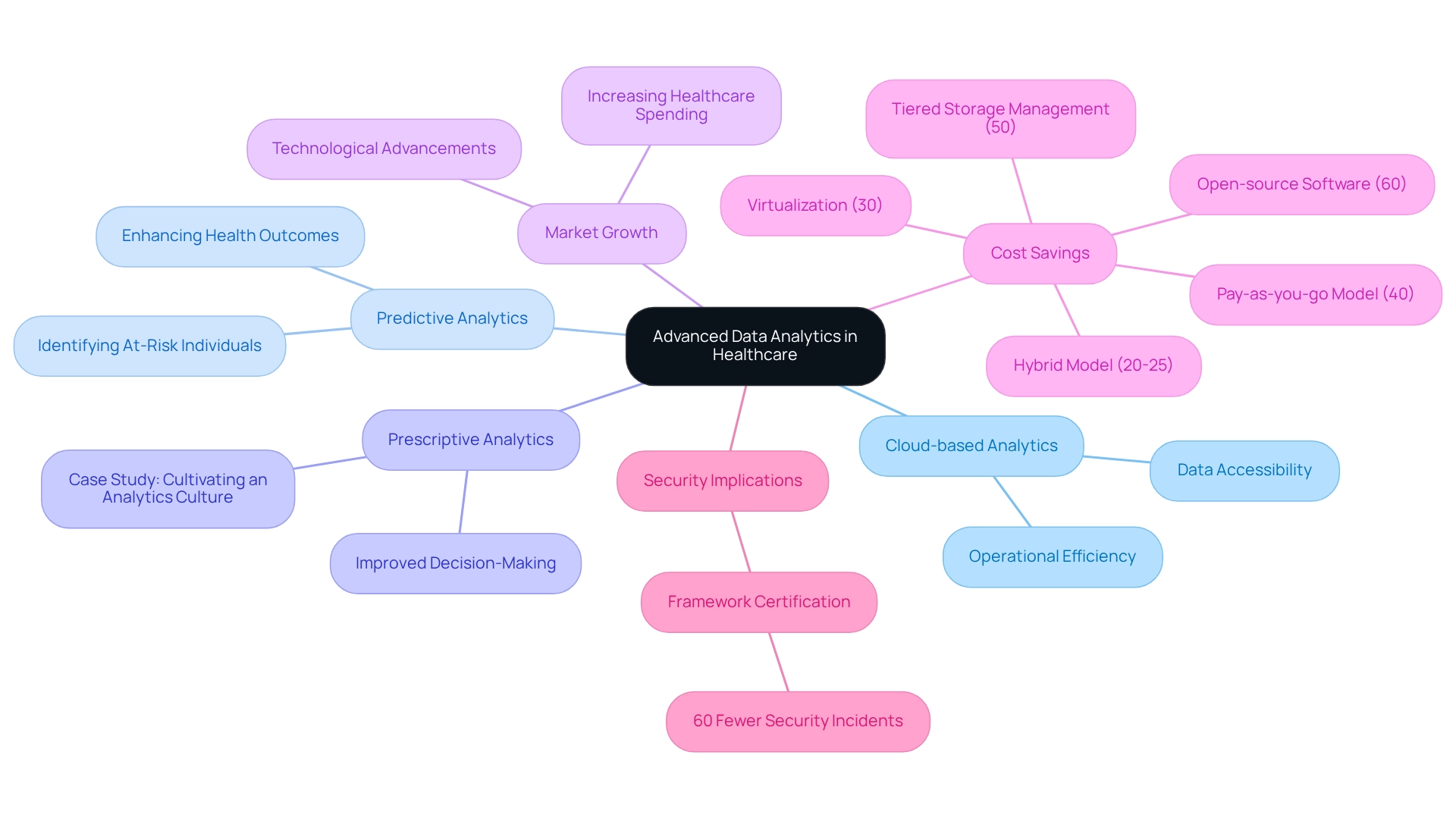
Flexibility to Innovate and Adapt to New Technologies
Cloud computing is revolutionizing the medical industry, providing organizations with the flexibility to swiftly adopt new technologies and innovations—an absolute necessity in an environment characterized by rapid advancements. This adaptability allows us, as providers, to seamlessly integrate telehealth offerings into our existing online infrastructures, thereby promoting remote care services with minimal disruption to our operations. Medical leaders consistently emphasize that the ability to embrace new technologies is crucial for enhancing patient care and operational efficiency. Indeed, a significant number of medical organizations have reported that cloud computing has empowered them to implement new technologies more effectively, with studies revealing that over 70% of providers are leveraging cloud solutions to enhance their service offerings.
Furthermore, the integration of cloud-based platforms fosters innovation by delivering the essential infrastructure for real-time data access and decision-making. Our Avato Hybrid Integration Platform plays a pivotal role in this landscape, maximizing and extending the value of legacy systems while simplifying complex integrations. This capability is vital for ensuring 24/7 uptime and reliability in critical sectors such as medical services, banking, and government. Additionally, our platform provides real-time monitoring and alerts on system performance, which is essential for maintaining operational efficiency. As noted by Google Health, “We think that AI is poised to transform medicine, delivering new, assistive technologies that will empower doctors to better serve their patients.” As the medical field evolves, the importance of investing in upskilling our workforce to embrace AI technologies and other advancements cannot be overstated. Addressing challenges such as data quality and technical infrastructure, as highlighted in the case study on AI adoption, is essential for realizing the full potential of these innovations.
Real-world examples illustrate the impact of online flexibility on telehealth integration. Providers who have adopted online systems report increased patient engagement and satisfaction, underscoring the transformative influence of technology in medical care. Moreover, the challenges of interoperability highlight the critical role that online services play in overcoming these obstacles. As industry experts have pointed out, the future of medical services hinges on our capacity to adapt and innovate, making cloud computing an indispensable resource for contemporary providers. Ethical data access and domain knowledge are also crucial factors for leaders in the medical field when implementing these strategies. Additionally, the cost reduction aspect of our Avato Hybrid Integration Platform enhances its value proposition, making it an attractive choice for organizations seeking to optimize their operations.
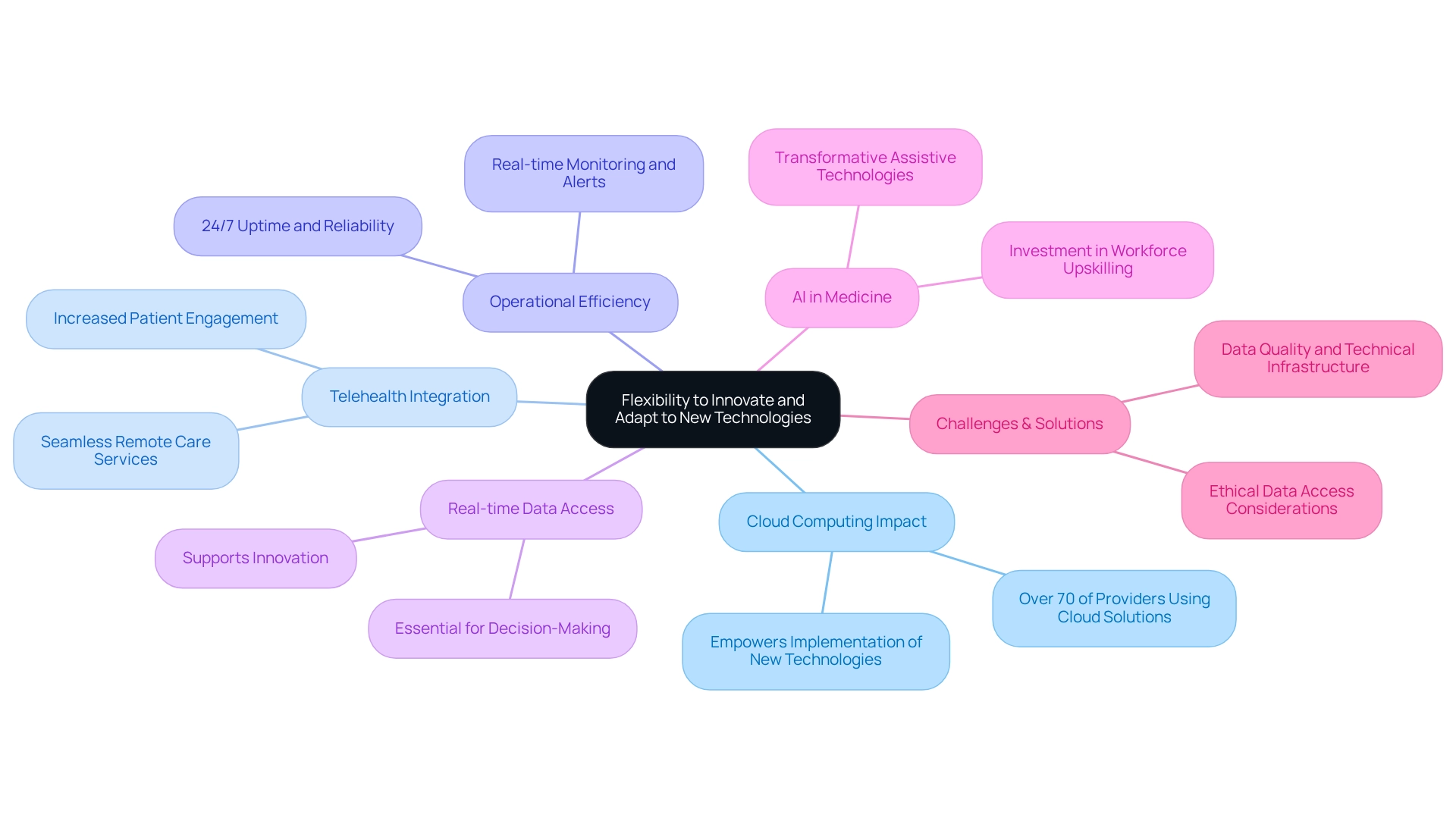
Support for Telehealth and Remote Patient Monitoring
Support for Telehealth and Remote Patient Monitoring
Cloud solutions are pivotal in advancing telehealth and remote patient monitoring initiatives. By harnessing healthcare cloud adoption, we can facilitate virtual consultations, allowing individuals to receive care from the comfort of their homes. This shift is underscored by a significant increase in telemedicine adoption, with physician usage soaring from 15.4% in 2019 to 86.5% in 2021. Moreover, remote monitoring tools enable medical professionals to monitor individuals’ health metrics in real-time, facilitating proactive care and prompt interventions. This capability is particularly vital for managing chronic conditions, as it ensures continuity of care and improves outcomes for individuals.
Despite the rapid growth of telehealth, challenges persist. A case study on technological and accessibility challenges in telehealth revealed that:
- 34 million Americans lack adequate broadband access
- Technical issues affect 40% of telehealth encounters
These barriers highlight the urgent need for improvements in telehealth technology and infrastructure to ensure equitable access and effective care delivery. Our Hybrid Integration Platform tackles these challenges by offering a secure, scalable, and dependable platform that improves connectivity and accessibility, ensuring 24/7 uptime and reliability for complex systems in the medical field. Additionally, it offers real-time monitoring and alerts on system performance, which are crucial for maintaining optimal operational efficiency.
Furthermore, 63% of individuals show interest in broadened digital wellness options, such as online appointment scheduling and digital-first care plans, indicating a strong demand for improved virtual care alternatives. As medical professionals increasingly acknowledge the value of virtual consultations, our healthcare cloud adoption through the integration of Avato’s hybrid solutions becomes essential for delivering high-quality, accessible medical services. As Gustavo Estrada observed, “Avato has the capability to simplify intricate projects and produce outcomes within preferred time frames and budget limitations,” demonstrating how our platform can assist providers in managing the complexities of telehealth and remote patient monitoring.
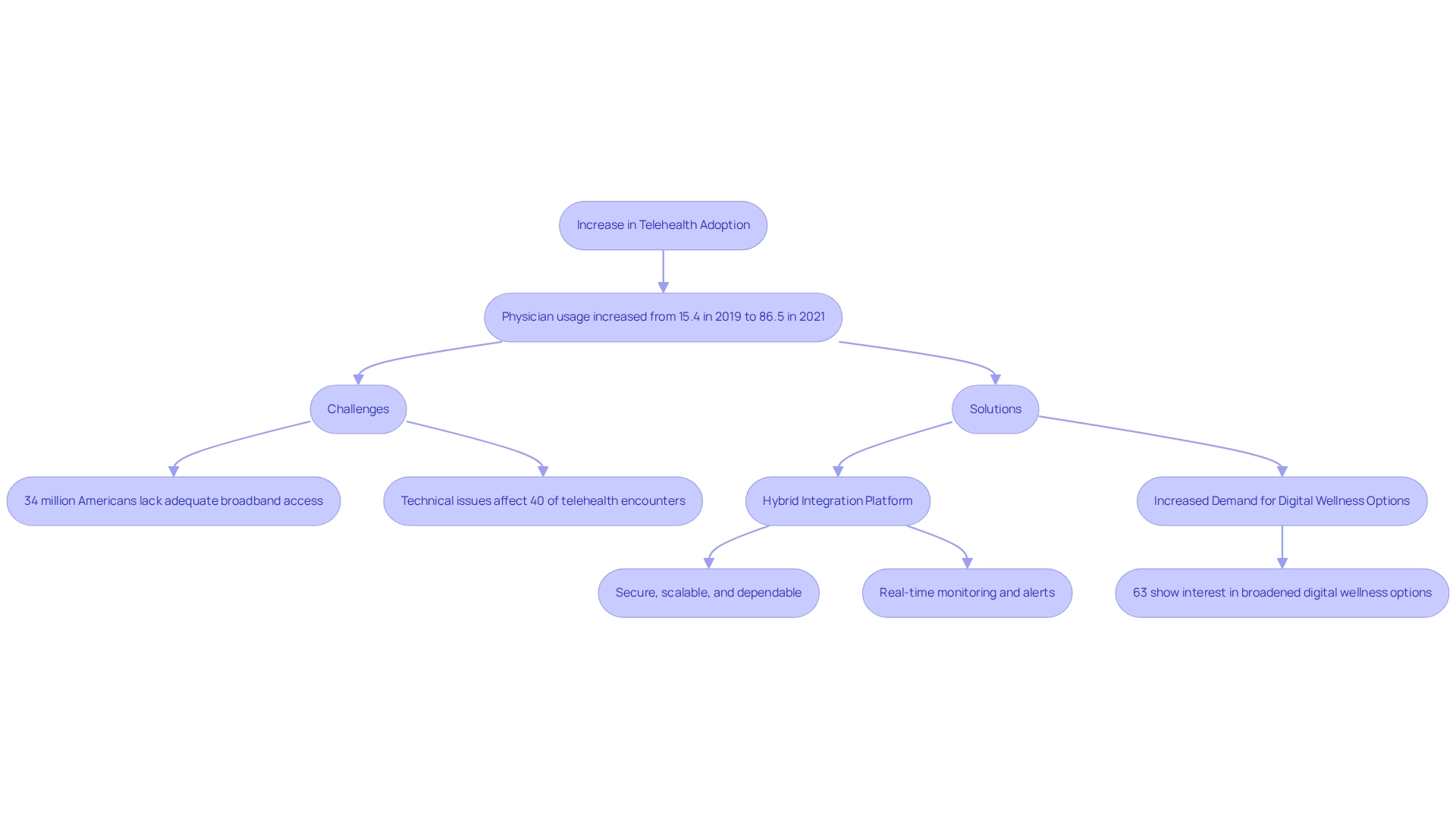
Seamless Integration with Existing Healthcare Systems
Cloud computing is essential for seamless integration with existing medical systems, such as electronic health records (EHRs) and practice management software. This integration allows us to leverage our established systems while benefiting from cloud technology. For instance, Avato’s Hybrid Integration Platform maximizes and extends the value of legacy systems, enabling us to manage complex integrations easily and efficiently. As a result, we significantly improve data interoperability, allowing different systems to communicate and share crucial information effortlessly. This integration is vital for enhancing care coordination and ensuring that healthcare professionals have comprehensive patient information at their fingertips when making clinical decisions.
Statistics reveal that nearly 80% of executives recognize technology as critical for future sustainability initiatives—a sentiment that resonates strongly within the healthcare sector as we strive to modernize our operations through digital solutions. Moreover, real-world examples underscore the impact of digital technology on EHR interoperability. A notable case is when Applause utilized CloudZero to optimize its online infrastructure expenses, resulting in a 23% reduction in costs and improved financial management. This case illustrates the potential for digital services, such as ours at Avato, to enhance operational efficiency and strengthen the financial stability of medical organizations, which is particularly relevant for banking IT managers overseeing financial activities in the healthcare domain.
Expert insights further highlight the significance of system interoperability in healthcare. Meghan Gabriel from the US Department of Health and Human Services points out the rapid growth of e-prescribing and electronic prescriptions of controlled substances (EPCS), fueled by state and federal initiatives. This trend illustrates our increasing reliance on internet-based systems to facilitate secure and efficient data exchange among medical providers, underscoring the urgency for us to adopt these technologies.
However, it is crucial to acknowledge that internet computing security remains a significant concern and barrier to adoption. Banking IT managers must consider these challenges when evaluating online solutions for medical interoperability. As we advance in healthcare, integrating online technology with our current systems will be essential for enhancing data interoperability and promoting cloud adoption, ultimately leading to improved health outcomes and more coordinated care. To navigate this evolving landscape effectively, we encourage banking IT managers to prioritize security measures, leverage real-time monitoring and alerts on system performance provided by our platform, and craft a strategic approach to cloud adoption that aligns with their organizational goals.
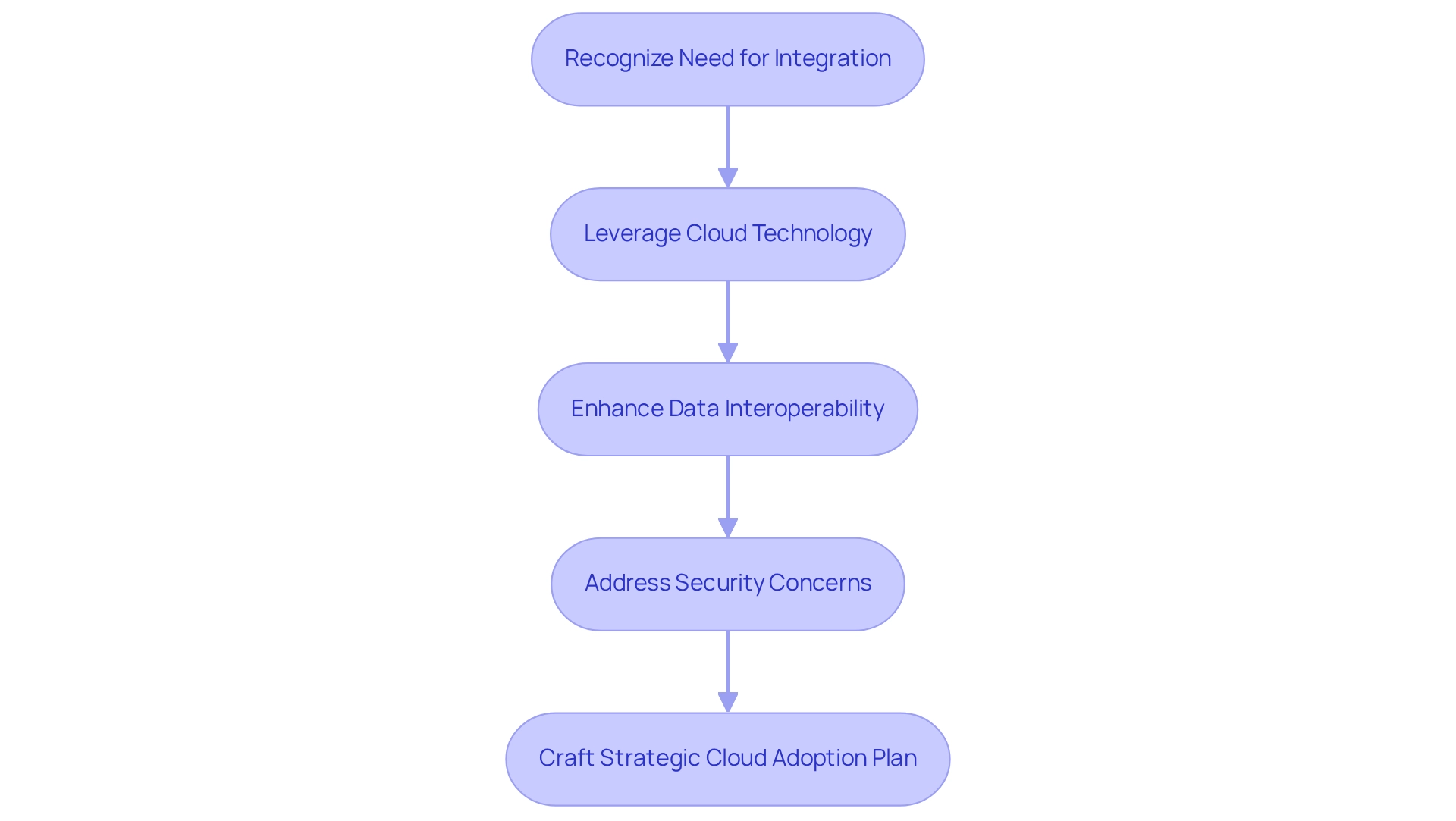
Improved Patient Engagement and Experience
Cloud computing significantly enhances user engagement by providing seamless access to health information through portals and mobile applications. We empower individuals to actively manage their health, enabling them to view test results, schedule appointments, and communicate directly with healthcare providers. This level of involvement is essential; studies show that enhanced participant interaction correlates with higher satisfaction rates and better adherence to treatment plans. For instance, a review highlighted that 56% of respondents scored 7 out of 8 on medication adherence, showcasing the positive impact of accessible health information.
Furthermore, preferences lean towards using online medical records or provider-specific portals rather than third-party applications. In 2022, a striking 98% of individuals reported not utilizing electronic personal health record apps, suggesting a strong inclination towards existing provider portals. This trend highlights the significance of comprehending user traits and contentment in relation to portal adoption. Notably, demographics show that middle-aged and married individuals are more inclined to utilize these portals, as noted by Zhong in 2018.
In addition, expert insights reveal that mobile applications play a crucial role in improving user satisfaction. By enhancing access to health information, we facilitate better communication and encourage participation in preventive care initiatives. The combination of AI and VR technologies further enhances this experience, as they can provide personalized interactions and support, making medical services feel more humanized. For instance, the application of AI avatars such as SimCoach can provide individuals a compassionate listener, while VR technologies can assist individuals in managing discomfort during procedures, highlighting the transformative potential of digital medicine.
As a result, the mean difference in baseline HbA levels between users and nonusers was found to be 0.89%, further demonstrating the health outcomes linked to individual engagement through cloud-based solutions. As healthcare continues to evolve, our commitment to healthcare cloud adoption for patient engagement will be essential for providers aiming to enhance the overall healthcare experience. Understanding user characteristics and satisfaction will be key to maximizing the benefits of these technologies, especially when considering the potential side effects of traditional treatments compared to digital medicine.
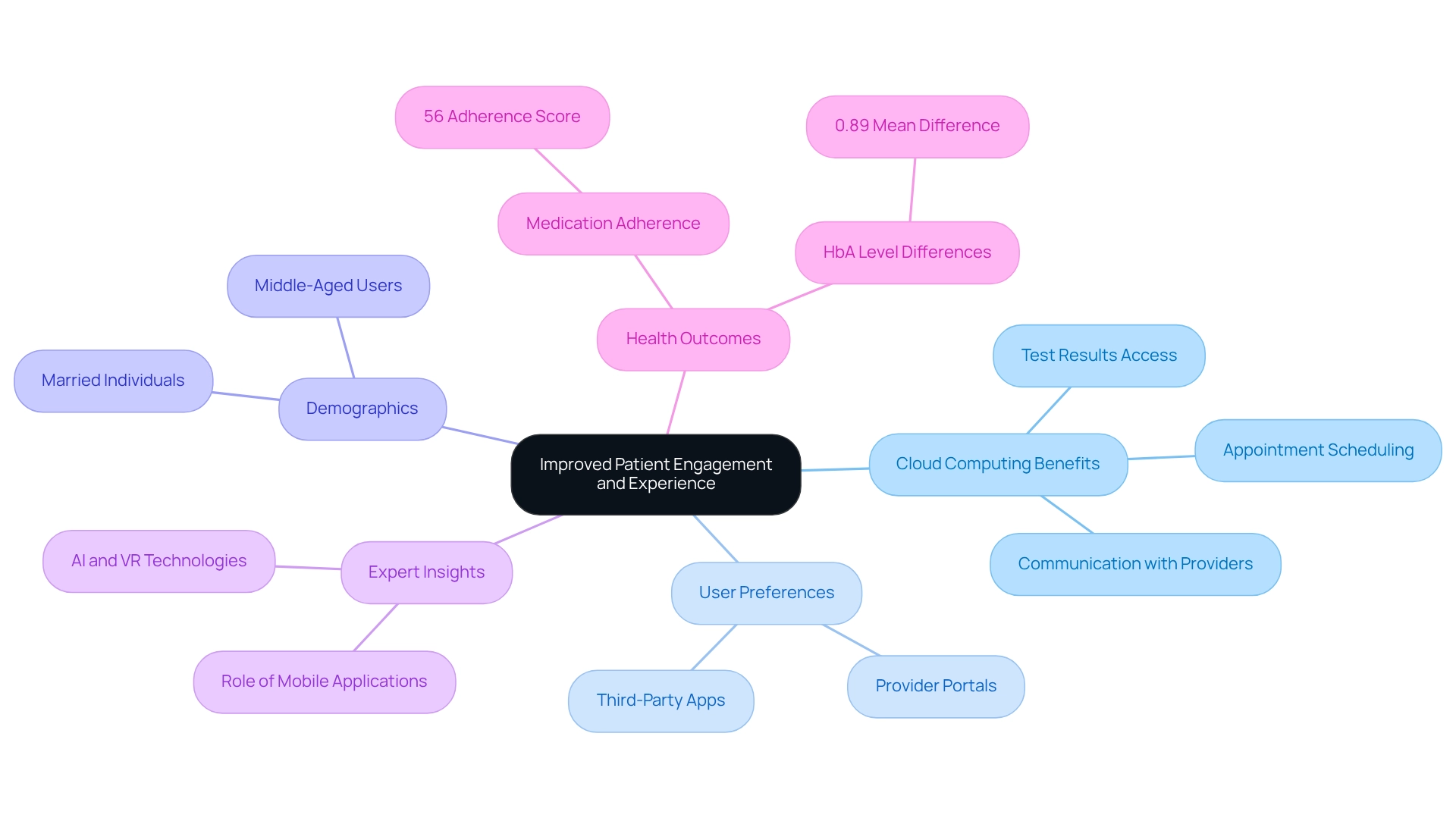
Conclusion
The integration of cloud computing in healthcare is not just an advancement; it is a game-changer that enhances patient care, operational efficiency, and system resilience. By providing real-time access to vital patient data, we enable healthcare providers to make quick, informed decisions, significantly improving care quality and patient outcomes. Advanced technologies like AI and data analytics further empower patients to take an active role in their health management.
Moreover, cloud solutions reduce reliance on costly on-premises infrastructure, leading to significant cost savings and more effective resource allocation. Their inherent scalability allows us to adapt to changing patient demands while maintaining high service levels.
Security and compliance are paramount in healthcare, and cloud technologies provide robust measures to protect sensitive patient information while meeting regulatory requirements. The seamless integration of cloud systems enhances collaboration among healthcare teams, improving care coordination and reducing redundancies.
As the healthcare landscape evolves, embracing cloud computing becomes essential for us as modern providers. The ability to innovate and improve patient experiences through effective data management is unprecedented. It is crucial for all healthcare stakeholders to come together and leverage this technological shift, ultimately creating a more responsive, efficient, and patient-centered healthcare system for the future.

